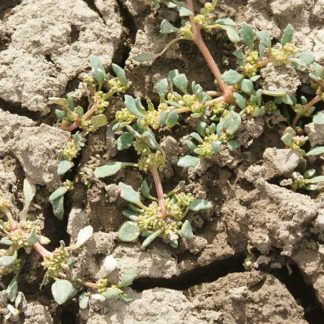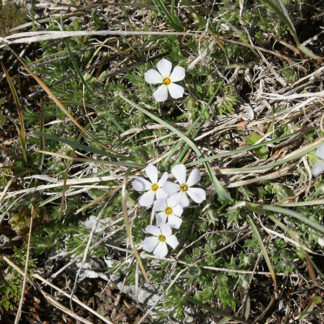exposed
Showing 85–96 of 135 results
-

Oxybasis glauca / oak-leaved goosefoot
- typically prostrate and small, apart from other plants
- mudflats and other drying wet areas
- small, blue-green, small-lobed leaves; often w/ reddish stems
- teeny clusters of teeny yellow flowers
- leaves feel cool and damp due to glandular hairs on lower surface
-

Oxytropis sericea / white-point vetch
- white "pea" flowers in clusters of up to 25
- banner petal white with purple/blue veins
- hairy, pinnately compound leaves, all basal
- disturbed areas, especially exposed to cold, drought, high light etc.
- pretty, but toxic to grazing animals
-

Packera cana / woolly groundsel
- yellow, daisy-like blossoms with 8-13 ray florets ("petals")
- golden, central disks
- blossoms in flat-topped clusters of up to 15
- mostly basal leaves - unlobed, hairy, ovate, up to 2 inches long
- overall silvery appearance
-

Packera multilobata / lobeleaf groundsel
- deeply lobed leaves, mostly at the base of the plant
- bright yellow daisy-like flowers, 10-30 in a cluster per plant
- orange-yellow disk florets
- woodlands, foothills, and generally dry/ sandy/ rocky places.
-

Pedicularis contorta / curved-beak lousewort
- alpine and subalpine habitats
- fern-like leaves at base
- tall, spikey inflorescence
- white flowers with coiled upper beak and flat, 3-lobed lower lip
-

Pedicularis groenlandica / elephant head
- flowers range from pink to purple or white
- flowers each have a long, pointed, upward curving beak like an elephant's trunk and lateral lobes that look like elephant's ears
- sharply-toothed fernlike leaves
- wet environments in late June, early July
-

Penstemon palmeri / Palmer’s penstemon
- very tall, exposed
- pink flowers with rose/grape scent
- flowers clumped on one side of stem in groups of 4-5
- red "guidelines" (bloody fangs) on lower petals
- stem leaves opposite, clasping, like little boats
-

Penstemon rydbergii / Rydberg’s penstemon
- small, blue/purple tubular flowers in leafy whorls
- flowers lack glands or hairs
- basal rosette of bright green, spoon-shaped leaves without glands or hairs
- stem leaves are lanceolate, around flower clusters
- wetter areas, but also along Victor/Driggs bike path
-

Penstemon whippleanus / dusky beardtongue
- large-ish purple or creamy-white tubular flowers
- from the side, flowers look like a gaping mouth; 2 lobes above, 3 below
- flowers typically hang down in small clusters at the top of their stems
- opposite, sessile leaves on flowering stems
- subalpine on rocky areas, as at Darby wind cave
-

Phleum pratense / timothy
- tight, cylindrical flower head
- probably the most recognizable grass in the Valley
- pink stamens with prodigious pollen production in summer
- bulb at base of stem; brown leaf sheath bases
-

Phlox diffusa / spreading phlox
- low, spreading, moss-like (before blooming)
- flowers 5-petaled, a variety of colors, and with a tube below the petals
- many habitat types incl. mountain slopes, rocky terrain, dry forests or with sagebrush
- blooms in early spring to early summer
- confusable with P. hoodii
-

Phlox hoodii / spiny phlox
- half-inch, five (or four) petaled flower with yellow center
- low to ground, mat forming, moss-like
- tightly packed, narrow, spiny leaves
- blooms in very early spring, just after snowmelt
- with sagebrush on dry, rocky soils
Showing 85–96 of 135 results